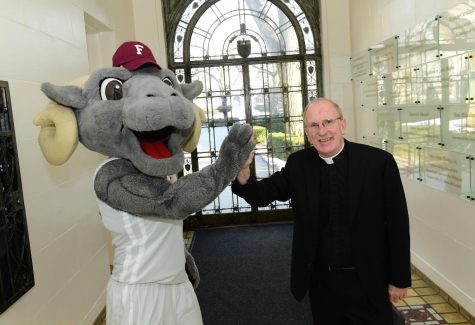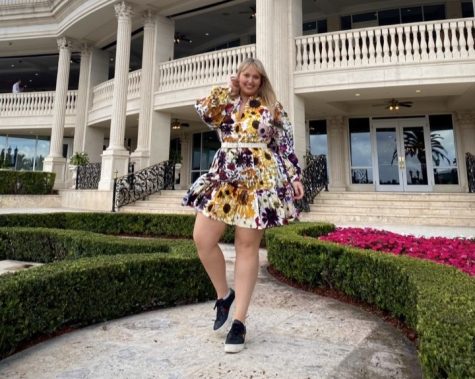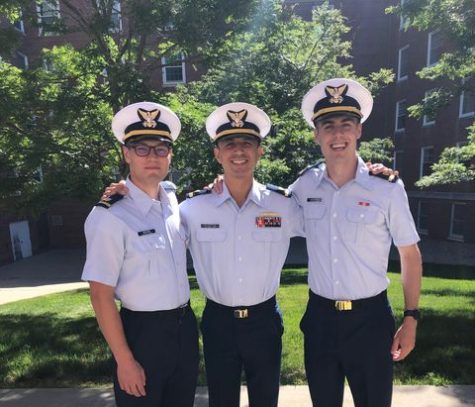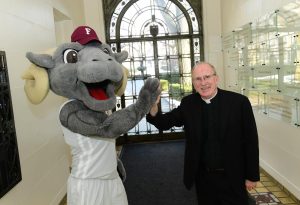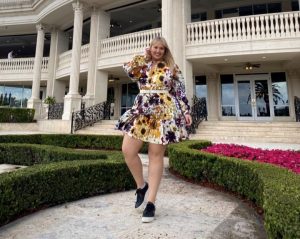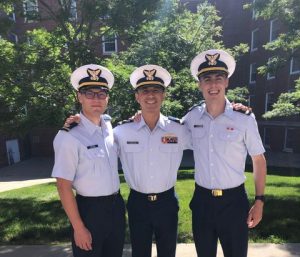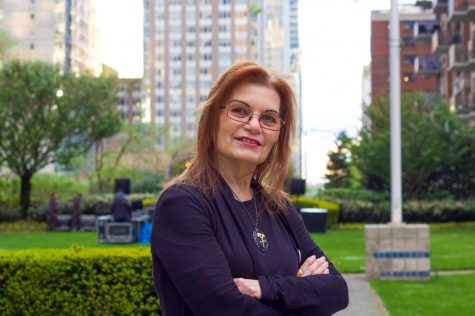Confessions of a 64-Year-Young Fordham Undergrad
My journey of returning to school and finishing my degree as an older student
COURTESY OF ANGELA LOCASCIO
The author at left in her high school yearbook photo, 1975. At right, the author in 2021 at age 64.
February 6, 2022
They say, “Youth is wasted on the young.”
But here I stand, a 64-year-old junior undergraduate student, living out my youth, wishing I knew then what I know now.
To tell you the truth, going back to school was the scariest decision of my life. Obtaining a college education is typically viewed as belonging to a specific age group — usually 18- to 22-year-olds. Students like me are often left out of consideration when one mentions college students.
Carole Cox, a professor in the Graduate School of Social Service, defines “ageism” as discrimination and even oppression on the basis of age, which can have a negative psychological impact on older adults. It differentiates and stigmatizes them as “less worthy.” College Rankings say that many colleges across America have large populations of older students.
Yet still, people ask me: Why did you go back to school?
It took support from my daughter Andrea, Fordham Graduate School of Social Service ’20, and my friend Brenda, who became a lawyer at 58, to feel brave enough to go back to school.
“Angela, you have a world-class mind — go back to school,” Brenda advised me. “We are not our mothers’ daughters; we women deserve our education.”
I have accomplished much in my life. I am a published author, youth advocate, human rights activist and public speaker. Yet still, people ask me: Why did you go back to school?
I felt humiliated one evening after speaking at Saint John’s University for the Take Back the Night event representing my organization, RAINN. I had just revealed my truth from my memoir “Living With Rage,” which chronicles my experience of domestic and sexual abuse. The audience stood and applauded me for my bravery. During the Q&A session, a student asked me what degree I had.
I stood there almost paralyzed. I was already in my 50s and feared going back to school. I felt my shoulders hunch, and I folded my arms tightly around my torso as I tried to hold on to some dignity after feeling elated over my speech.
What I failed to tell them was that I did attend Hunter College for two years and then dropped out of school to help my family financially. I could not tell them that I never went back. I would rather they knew about my assault and that I married, had children and raised a child with special needs than the fact that I didn’t have the confidence to go back to school because I was old and felt shame for not having a degree.
I advised the audience that being young was a gift. Take your youth and grasp it to do well; build on your education and take it forward to create a great future for yourselves. If you want a degree, you have to work hard for it. That is why you are in school.
Life is precious, and don’t let your fears or others tell you that you cannot do what you have set out to do here.
And that is what I want my young Fordham family to know: Life is precious, and don’t let your fears or others tell you that you cannot do what you have set out to do here. If I can do it at my age — and don’t let your fears of failure hold you back from what you want.
Go the distance, because going to school at any age is hard. But when you are older and have a family to care for, it’s harder because there is little time for you.
I knew going back would be difficult. Yet, I bit the bullet and entered college at 60 after years in the workforce. My very first class was on Aug. 27, 2017. It was a night class called Faith and Critical Reasoning. As I walked the halls that day, I looked at a swarm of 20-year-olds who could be my grandchildren, and I wanted to run. I admit that for a while, I sat in class like a wallflower, participating as little as possible. I didn’t want to bring attention to myself, fearing that my age and my views would seem too old for my younger classmates.
I knew that at my age, I did have something to contribute, and that empowered me.
Weeks later, our professor, a woman young enough to be my daughter, began to lecture about Dr. Martin Luther King Jr. I chimed in and told her that I remembered the day King was assassinated: April 4, 1968. I was 11. His murder influenced me, just as President John F. Kennedy’s did on Nov. 22, 1963.
She sat in her chair and let me take over the class for a while. My younger peers thought I was the coolest person in the classroom. That was my turning point at Fordham: I knew that at my age, I did have something to contribute, and that empowered me.
I joined Campus Ministry, and I am a Campus Ministry leader. Through the Office of Multicultural Affairs, I am a certified LGBTQ+ ally, and now, I write for The Observer. These groups helped me fit in and become a proud member of the Fordham family.
Helping older students become involved on campus in similar activities is crucial to destigmatizing their age and creating an environment where students of any age can feel welcome.
My younger peers were quite welcoming. I overcame my fear of ageism and felt at home at Fordham. Helping older students become involved on campus in similar activities is crucial to destigmatizing their age and creating an environment where students of any age can feel welcome.
During an Observer meeting, I told my fellow writers my age. They said that I looked like I was in my 40s. As great as that made me feel, I also felt a bit lonely. Here I was in a room with young and gifted writers, and I wished I could turn back my own clock. But I could not, because, as for all of us, age happens. That’s the will of nature.
Yet, I do admit, I am proud of my age. I am going to be 65 in April, and I think that for my age, I look pretty good.
Nature may have its will, but like everything else I will defy it. Come 2023, I will march down the aisle with my fellow seniors as a proud Fordham graduate at 66 years young.


